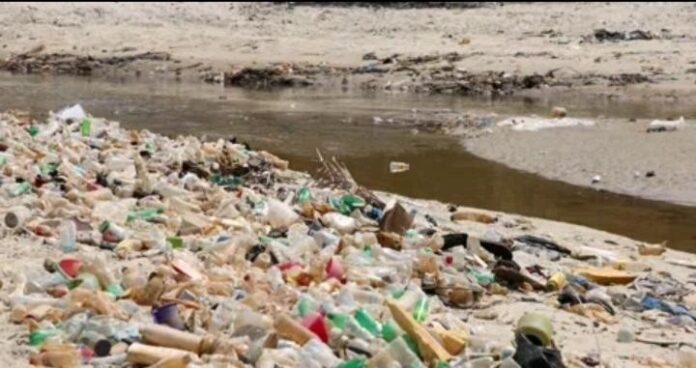By Millicent Senava Mannah
Walking through the bustling streets of Freetown, it is impossible to ignore the sight of plastic bottles, in gutters, piled along street corners, or floating down the once-pristine streams. On a hot July afternoon, I stopped to watch a group of children playing near a drain clogged with bottles and sachet water wrappers. The smell of burning plastic from a nearby dumpsite filled the air, its thick smoke curling into the sky.
This scene, sadly, is not unique to one street or one city. Across Sierra Leone, plastic bottles have become part of the landscape, choking our drains, polluting our rivers, and feeding the fires of open-air dumps that spew black smoke into the air we breathe. Yet, as I’ve learned while reporting this story, every bottle we carelessly throw away adds not just to the litter around us, but also to the climate crisis that threatens our very future.
Plastic bottles seem harmless enough at first glance, lightweight, convenient, and cheap. But the truth is far more troubling. Producing plastic relies on fossil fuels, and burning or improperly disposing of it releases greenhouse gases and toxic chemicals. According to the Environmental Protection Agency (EPA), the majority of plastic waste in Sierra Leone ends up in landfills or is burned, contributing to carbon emissions that worsen climate change.
“We don’t realize how much damage these bottles cause,” Mariatu Sesay, a waste management advocate, told me. “They block drainage systems, worsen flooding during rains, and when burned, pollute the air and add to global warming. Yet we keep using them like they don’t matter.”
During my reporting, I came across a small workshop in Bo where plastic bottles are being turned into bricks and furniture. The young men there were proud of their work, making something useful out of waste while earning an income. But they admitted it was difficult to find enough bottles in good condition because most are either burned or dumped into rivers.
Their project is just one of a handful in Sierra Leone. There is no national recycling system, no dedicated collection points, and very little public awareness about why recycling even matters. Yet experts believe the potential is huge, for the environment, the economy, and the fight against climate change.
“Every bottle we recycle means fewer emissions, less pollution, and fewer bottles in our rivers,” environmentalist Abu Kamara explained. “It also means jobs. But the government needs to invest in recycling plants and educate people to separate their waste.”
As I walked back home, I found myself counting how many plastic bottles I had used that day, three. Usually, I’d toss them into the trash or leave them somewhere. But now I wonder: what if I brought them to someone who could recycle them? What if we all did?
Sierra Leone has a long way to go in tackling climate change, but recycling plastic bottles is one small, simple step we can all take. Citizens can reuse bottles, avoid single-use plastics when possible, and support local recycling efforts. Meanwhile, policymakers must strengthen waste management laws, build recycling infrastructure, and create incentives for green businesses.
Looking at those children playing beside the clogged drain, I couldn’t help but think about the future they inherit. Climate change is not some distant threat, it is here, now, in our floods, our failing crops, and our scorching heat.
It starts with a choice. One bottle at a time.


